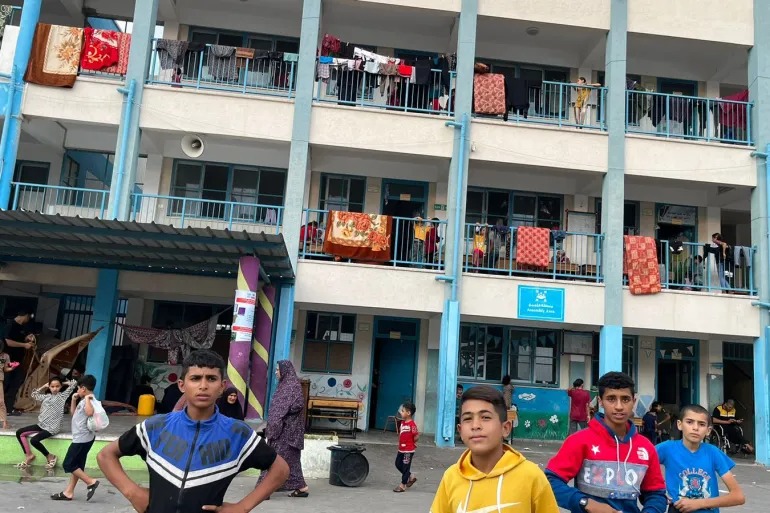In the heart of the Gaza Strip, more than half a million displaced Palestinians are enduring a harrowing ordeal. Shattered homes, constant Israeli bombardment, and a lack of basic necessities have forced them into the only places they believe might offer safety: United Nations Relief and Works Agency (UNRWA) schools. However, the situation within these makeshift shelters is deteriorating rapidly, with overcrowding and unsanitary conditions pushing the displaced population closer to a severe public health crisis. Days after an Israeli strike targeted a UNRWA school in the central Gaza Strip, resulting in casualties, these schools are far from the sanctuaries humanitarian agencies had envisioned.
Humanitarian Crisis Deepens Amidst Israeli Attacks
Over 613,000 of the 1.4 million internally displaced Palestinians in Gaza have sought refuge in 150 UNRWA facilities across the besieged territory. The UNRWA facilities were meant to provide a temporary respite from the relentless Israeli attacks. However, severe overcrowding, inadequate sanitation, and a lack of privacy have turned these schools into ticking time bombs, adding immense pressure to an already strained healthcare system that is on the brink of collapse.
The recent bombing of an UNRWA school in the al-Maghazi refugee camp, which left dozens injured, shattered any illusion that these schools are immune to destruction. Philippe Lazzarini, UNRWA Commissioner-General, decried the situation, stating that “no place is safe in Gaza anymore, not even UNRWA facilities.”
The displaced individuals residing in these schools are not only grappling with overcrowding but also facing shortages of water, electricity, food, and essential supplies, including sanitary pads, disinfectants, and pain relief. Some shelters are currently housing up to 10 to 12 times their intended capacity, with one school in Khan Younis accommodating a staggering 21,000 people. The lack of access to basic necessities compounds their misery.
Overcrowded UNRWA Schools at Risk of Prolonged Health Crisis
In Khan Younis, Noor and her family are among the many who sought refuge in UNRWA schools after their home was damaged in an Israeli air raid. Noor describes the dire conditions, with overcrowded classrooms and a shortage of water and electricity. The lack of basic amenities and overcrowding has created an environment ripe for the outbreak of diseases.
These UNRWA schools have also become hotspots for diseases like scabies and smallpox due to overcrowding and unsuitable hygiene facilities. These conditions only exacerbate the suffering of displaced Palestinians, particularly when it comes to menstruation.
Unsuitable Living Conditions Aggravate Menstrual Hygiene Challenges
Amid the dire circumstances, women and girls are facing profound difficulties related to menstruation. Noor emphasizes the nightmare of menstruating in these shelters, where there are no blankets, comfortable mattresses, sanitary pads, pain relievers, or even access to hot water for soothing beverages. Some girls have even resorted to medication to prevent menstruation, fearing embarrassment and added pain. Others have taken to washing and reusing sanitary pads, unknowingly risking their health due to potential contamination.
In another UNRWA school in al-Maghazi, Amal and her family are struggling to find basic necessities, including diapers for her youngest son. The total siege of the Gaza Strip and unrelenting bombings have severely restricted access to essential services, posing a significant health risk to displaced Palestinians. Amal’s story reflects the grim reality many face, as she uses cloths instead of nappies for her son, leading to severe rashes. With a lack of sufficient blankets, her other children are battling colds and colic.
As the situation in Gaza continues to deteriorate, displaced Palestinians find themselves caught in a relentless cycle of violence, overcrowded shelters, and inadequate resources. The humanitarian crisis in Gaza is reaching critical levels, with urgent international intervention needed to address the suffering of the displaced population and prevent a further escalation of the public health crisis.
















